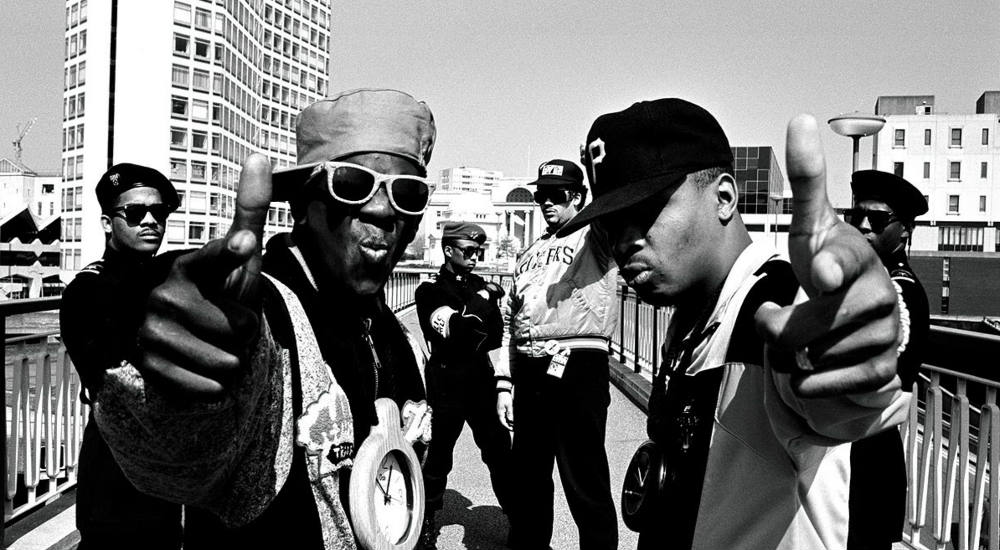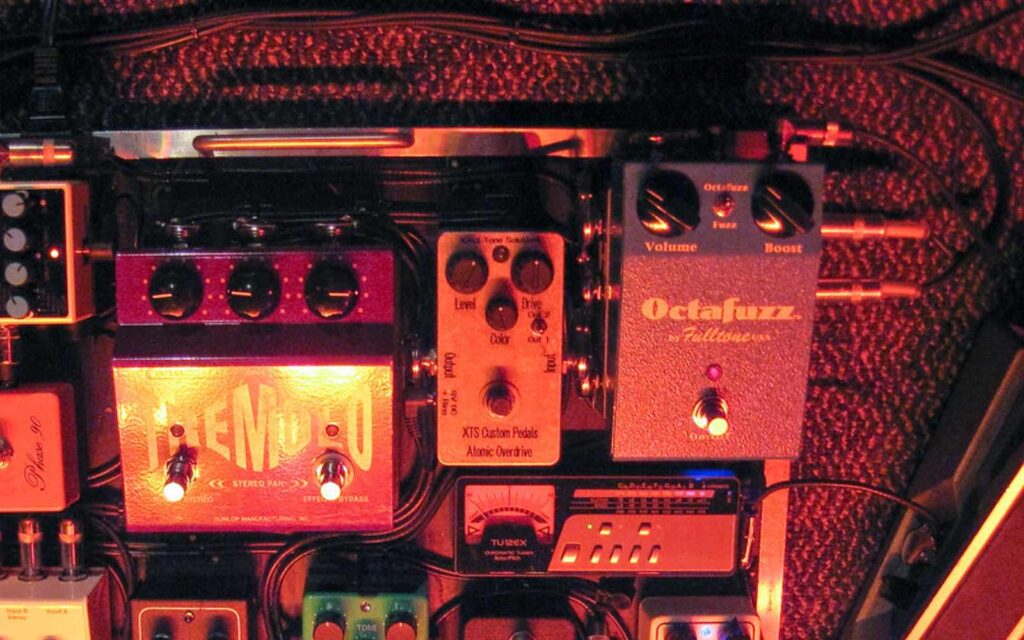‘BRING THE NOISE’
SONGS SAMPLED: ‘Funky Drummer’ – James Brown; ‘Get Off Your Ass and Jam’ – Funkadelic; ‘The Assembly Line’ – The Commodores; ‘Fire and Fury Grassroots Speech’ – Malcolm X.
Arguably the biggest song from It Takes A Nation of Millions to Hold Us Back, ‘Bring The Noise’ is a mainstay within hip-hop culture. It’s been sampled numerous times throughout the works of De La Soul and Kanye West, and was also covered by thrash metal band Anthrax three years after its release in 1991. The song kicks off with an unmistakable sample of black civil rights activist Malcolm X repeatedly proclaiming “too black, too strong,” from his seminal ‘Fire and Fury’ Grassroots Speech in Michigan, 1963. Many of the spoken word and vocal samples across the LP were chosen by Chuck D himself, who would instruct production group The Bomb Squad to chop them up and add them into the songs to reinforce his lyrical messages.
As well as excerpts from Funkadelic’s boogie ‘Get Off Your Ass and Jam’ (listen to the first three seconds here and compare it with ‘Bring The Noise’) and a drum break from The Commodores’ ‘Assembly Line,’ ‘Bring The Noise’ also makes use of one of the most used samples of all time – the unmistakable drum break from James Brown’s ‘Funky Drummer.’ Performed by Clyde Stubblefield, the signature drum break appears countless times on the record, as well as albums by other historic artists such as NWA, Prince and LL Cool J.
‘NIGHT OF THE LIVING BASEHEADS’
SONGS SAMPLED: ‘Fame’ – David Bowie; ‘Christmas Rappin” – Kurtis Blow; ‘Rock Steady’ – Aretha Franklin; ‘UFO’ – ESG; ‘I Can’t Get Next To You’ – The Temptations; ‘Bring The Noise’ – Public Enemy.
Written in response to the crack cocaine epidemic that plagued the African-American community throughout the 1980’s, ‘Night Of The Living Baseheads’ features a slew of incredible sampling moments; however, one of the song’s finest samples actually comes from Public Enemy themselves. The song features a sample of Chuck D. yelling ‘Bass!’ from ‘Bring The Noise,’ which is repurposed within the context of the song to refer to ‘base’ – derived from freebasing, the practice of smoking crack cocaine. It’s a relatively effortless sample, but it works a treat within the song.
Elsewhere in the song, you can hear a spooky synth sample from New York funk-punk group ESG’s track ‘UFO,’ an instrumental break from David Bowie’s ‘Fame,’ a bass line sampled from Aretha Franklin’s ‘Rock Steady’ and a segment from early hip-hop OG Kurtis Blow’s holiday gem ‘Christmas Rappin” – a song so good that it’s almost impossible not to sample.
‘BLACK STEEL IN THE HOUR OF CHAOS’
SONGS SAMPLED: ‘Hyperbolicsyllabicsesquedalymistic’ – Isaac Hayes; ‘Living For The City’ – Stevie Wonder; ‘Little Green Apples’ – The Escorts; ‘Bring the Noise’ – Public Enemy.
Notable for Chuck D’s iconic anti-authoritarian opening sentiment (“I got a letter from the government the other day / I opened and read it / It said they were suckers”), ‘Black Steel In The Hour Of Chaos’ tells the story of a draft dodger’s intense prison escape, and is one of the most adored songs from It Takes A Nation Of Millions To Hold Us Back, with rappers Tricky and Rick Ross as well as Brazilian metal band Sepultura paying tribute to the track throughout the career. Throughout the song, Chuck D’s laid back flow is bolstered by a staunch, pitched-up piano sample from Isaac Hayes’ 1969 track ‘Hyperbolicsyllabicsesquedalymistic,’ the Stax icon behind canonical wah-wah hit ‘Theme From Shaft.’
In addition to the prominent piano sample from Hayes, ‘Black Steel’ borrows a snippet of lyrics from Stevie Wonder’s ode to urban hardship ‘Living For The City’, as well as a spoken word sample from the opening of funk band The Escort’s version of ‘Little Green Apples.’
‘COLD LAMPIN’ WITH FLAVOR’
SONGS SAMPLED: ‘Funk It Up (David’s Song)’ – The Sweet; ‘War’ – Edwin Starr; ‘Jungle Fever’ – The Chakachas; ‘Think (About It)’ – Lyn Collins; ‘Here We Go’ – Run DMC; ‘Gimme Some More’ – The JBs; ‘Girls’ – Beastie Boys.
A rare Public Enemy moment spotlighting the eccentric personality of clock-wearing hypeman Flavor Flav, ‘Cold Lampin’ With Flavor’ features over ten samples, most of which only appear momentarily throughout the song – such as Edwin Starr’s grunt from ‘War’ and a ‘Yeah’ from fellow hip-hop OG’s Run DMC and Beastie Boys – proving testament to the finnesse in detail and production talents of The Bomb Squad on the record. One of the song’s key samples is from a 1977 track named ‘Funk It Up’ performed by UK glam-rock band The Sweet, featuring a hooky guitar riff which is prominently repeated throughout the song in conjunction with a drum groove grabbed from The Chakachas’ ‘Jungle Fever.’
As always, there’s plenty of classic drum breaks from soul records throughout this track, with many being produced by the Godfather himself, Mr. James Brown – ‘Think (About It)’ by Lynn Collins and ‘Gimme Some More’ by The JBs both bear his name and production credit, further highlighting his prominence in the evolution of music and his importance to the art of sampling in hip-hop.
‘PROPHETS OF RAGE’
SONGS SAMPLED: ‘Man On The Run’ – Richard Pryor; ‘Shining Star’ – Earth, Wind & Fire; ‘Pump That Bass’ – Original Concept; ‘Hum Along and Dance’ – The Jackson 5; ‘Cold Sweat’ – James Brown.
Before the supergroup formed by members of Rage Against The Machine, Cypress Hill and Public Enemy claimed Prophets of Rage as their name, this track was the soundtrack to test many a car speaker throughout the ’80s. ‘Prophets of Rage’ opens with a radical snippet of dialogue from the Richard Pryor track ‘Man On The Run,’ before the lower frequencies implode at the introduction of the 808 bass paired with a brass sample from ‘Shining Star,’ a funky jam from disco legends Earth, Wind & Fire. However, what really drives ‘Prophets of Rage’ is the pitched-down guitar riff from The Jackson 5’s ‘Hum Along and Dance’ – it’s often forgotten just how good those Jackson kids were at playing their instruments.
Featuring yet another James Brown sample, ‘Prophets of Rage’ notably uses an extremely popular jungle and drum n’ bass break from ‘Cold Sweat,’ which was also used by Public Enemy in ‘Welcome To The Terrordome’, as well as tracks by John Frusciante, Aphex Twin, DJ Shadow and Shy FX. There’s also a vocal grab from an early release from Def Jam by a group called Original Concept – check out the “Get a lil’ stupid” line around the two minute mark.
‘PARTY FOR YOUR RIGHT TO FIGHT’
SONGS SAMPLED: ‘(You Gotta) Fight For Your Right (To Party!)’ – Beastie Boys; ‘Sing A Simple Song’ – Sly and the Family Stone; ‘Get Up, Stand Up’ – Bob Marley and The Wailers; ‘Butt-to-Butt Resuscitation’ – Funkadelic; ‘Get Up, Get Into It, Get Involved’ – James Brown; ‘I Know You Got Soul’ – Bobby Byrd; ‘1964 Boston Radio Broadcast’ – Malcolm X.
The final track from It Takes A Nation Of Millions To Hold Us Back, ‘Party For Your Right To Fight’ pulls no punches in pace and delivery, and is chock-a-block full of vocal snippets encouraging the listener to fight the system – particularly with the intent to party. While the song is principally built around a pitched and sped-up sample of Funkadelic’s ‘Butt-to-Butt Resuscitation’ and a vocal ad-lib from Sly and the Family Stone’s ‘Sing a Simple Song,’ the Beastie Boys classic ‘(You Gotta) Fight For Your Right (To Party!)’ gets a nod both in sample form and in the name of the song, while The Bomb Squad also pay tribute to Bob Marley and The Wailers’ revolutionary cry, sampling a snippet of ‘Get Up, Stand Up.’
Elsewhere, James Brown’s ‘Get Up, Get Into It, Get Involved’ receives a mention throughout the song, as does a lyric from ‘I Know You Got Soul’ by Bobby Byrd, as well as a portion of Malcolm X’s 1964 Boston Radio Broadcast calling for African-American resistance to racism, demonstrating Public Enemy’s prowess for merging both humorous and serious elements of black music and politics together to reinforce their message and create one of the most culturally significant records of all time.







